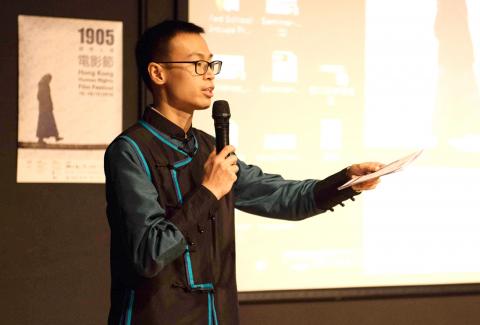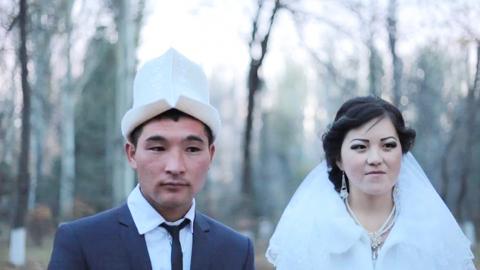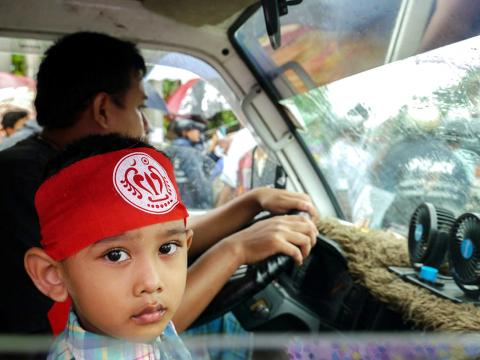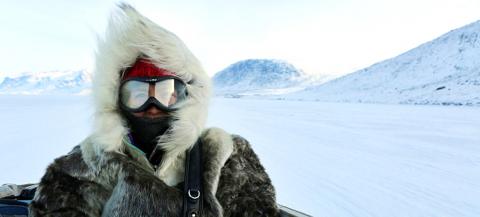Last month, the New York Times reported that Chinese activist Li Dan (李丹) had “relocated” his 1905 Hong Kong Human Rights Film Festival to Taiwan, with a smaller satellite festival in its original location.
Looking at the schedule, however, perhaps Li has changed his mind. The festival will indeed take place concurrently in both locations, but there are still significantly more offerings in Hong Kong than in Taiwan.
“It’s more like an expansion, because we can’t give up on Hong Kong,” Li says, noting that Taiwan’s freedom of speech allows for more opportunities for funding and exchanges. The festival will continue in Hong Kong, he says, to maintain his original purpose of exposing people there and China to human rights issues.

Photo courtesy of 1905 Human Rights Film Festival
In collaboration with the Formosa Festival of International Filmmakers (福爾摩沙國際電影節) and the Taiwan International Queer Film Festival (台灣國際酷兒影展), the renamed 1905 Human Rights Film Festival kicks off its Taiwan program on Saturday with 15 feature and documentary productions, shown mostly at smaller venues such as coffee shops, bookstores and universities.
ACTIVISM
Li has long been on the frontlines of Chinese activism, starting from his involvement in HIV prevention in 2003, for which he won the Reebok Human Rights Award in 2006 for non-violent activists under 30 years. In recent years, he’s turned his focus toward cultural activities, such as opening a bookstore in Hong Kong and establishing the China Women’s Film Festival.

Photo courtesy of 1905 Human
“You might think that you’ve made a significant difference as an activist fighting directly against the government. But when you count the number of people involved in human rights in China, both back then and today, there’s just a few thousand at most. For real change, we need strong civic participation. How do we get the public involved?” Li says.
Li says that although the festival pushes the envelope, it’s difficult to shut down a film festival. However, there’s no way that a human rights program would be allowed in China. And with Beijing tightening its control over Hong Kong, Li felt that opportunities for growth would be limited.
“It’s not to the point in Hong Kong where we can’t talk about anything, but it’s tough as far as seeking resources,” he says.

Photo courtesy of 1905 Human Rights Film Festival
SELF-CENSORSHIP
Li says he could seek funding from foreign embassies in China, but their Hong Kong counterparts have a much smaller budget for such activities. Hong Kong corporations that want to stay on China’s good side will avoid the festival due to its association with human rights, which greatly reduces the number of potential investors.
Even filmmakers are reluctant to participate or help out in fear of repercussions by the Chinese government, Li says.

Photo courtesy of 1905 Human Rights Film Festival
“People often think that we’re spies [coming from China],” he adds. “They think it’s strange that we’re able to put together such a film festival in Hong Kong without the government interfering. But we know how to find the cracks in the steel plate where we can operate.”
Li says the key is to keep a low profile, to remain outside of the “top 10.”
“Also, insist that you’re not doing anything new. When they question me, I just tell them, hey, Hong Kong already has the [Hong Kong Human Rights Documentary Film Festival],” he says.

Photo courtesy of 1905 Human Rights Film Festival
The main goal in establishing a presence in Taiwan, in addition to resources, is to establish a platform where filmmakers from the region and beyond can freely interact and exchange ideas.
“Taiwan already has a lot of film festivals, we don’t need to join in on the fun,” Li says. “We are looking for a long-term base where we can have workshops, collaborations, discussions, seminars, bring international filmmakers here and Taiwanese overseas.”

In the March 9 edition of the Taipei Times a piece by Ninon Godefroy ran with the headine “The quiet, gentle rhythm of Taiwan.” It started with the line “Taiwan is a small, humble place. There is no Eiffel Tower, no pyramids — no singular attraction that draws the world’s attention.” I laughed out loud at that. This was out of no disrespect for the author or the piece, which made some interesting analogies and good points about how both Din Tai Fung’s and Taiwan Semiconductor Manufacturing Co’s (TSMC, 台積電) meticulous attention to detail and quality are not quite up to

April 21 to April 27 Hsieh Er’s (謝娥) political fortunes were rising fast after she got out of jail and joined the Chinese Nationalist Party (KMT) in December 1945. Not only did she hold key positions in various committees, she was elected the only woman on the Taipei City Council and headed to Nanjing in 1946 as the sole Taiwanese female representative to the National Constituent Assembly. With the support of first lady Soong May-ling (宋美齡), she started the Taipei Women’s Association and Taiwan Provincial Women’s Association, where she

It is one of the more remarkable facts of Taiwan history that it was never occupied or claimed by any of the numerous kingdoms of southern China — Han or otherwise — that lay just across the water from it. None of their brilliant ministers ever discovered that Taiwan was a “core interest” of the state whose annexation was “inevitable.” As Paul Kua notes in an excellent monograph laying out how the Portuguese gave Taiwan the name “Formosa,” the first Europeans to express an interest in occupying Taiwan were the Spanish. Tonio Andrade in his seminal work, How Taiwan Became Chinese,

Mongolian influencer Anudari Daarya looks effortlessly glamorous and carefree in her social media posts — but the classically trained pianist’s road to acceptance as a transgender artist has been anything but easy. She is one of a growing number of Mongolian LGBTQ youth challenging stereotypes and fighting for acceptance through media representation in the socially conservative country. LGBTQ Mongolians often hide their identities from their employers and colleagues for fear of discrimination, with a survey by the non-profit LGBT Centre Mongolia showing that only 20 percent of people felt comfortable coming out at work. Daarya, 25, said she has faced discrimination since she